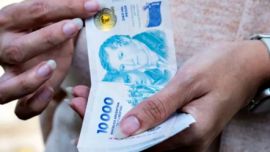Unexpectedly, President Mauricio Macri and his administration have found themselves between a rock and a hard place. Just a few months after consolidating their power with an impressive victory over Cristina Fernández de Kirchner, the Cambiemos (Let’s Change) coalition nonetheless finds itself at its most unpopular, weakened by accusations of corruption and a series of unforced errors, combined with a stubbornly slow economic recovery where opportunities abound for financiers while inflation burns through the purchasing power of the middle and lower economic classes. Contrappasso, as in Dante Alighieri’s Inferno.
The problem, once again, is perception. The continued contradictions of the Macri administration is eroding its trustworthiness in the eyes of many sectors of society who see how inflation targets for the year were raised to 20 percent, while María Eugenia Vidal and Horacio Rodriguez Larreta insist on a hard 15-percent ceiling on collective salary negotiations, preferably without trigger clauses. The perception of being nickel and dimed is exacerbated by public statements asking the population to trust the local currency, while Treasury Minister Nicolás Dujovne and Central Bank President Federico Sturzenegger are sitting on fortunes resting abroad, and made worse by continued hikes in public service costs, as natural gas bills are expected to jump by as much as 54 percent in April.
If Macri’s economic recovery doesn’t produce positive effects for society as a whole in the short-term, issues like the dangerous dependence on foreign indebtedness, the extreme — and still growing — commercial deficit, and the apparently untamable fiscal deficit will take centre stage. And Macri, Cabinet Chief Marcos Peña, and the economic team will go from saviours to false prophets, while the likes of union strongman Hugo Moyano and former president Fernández de Kirchner will find substance for their rallying cry against the government’s “neoliberal policies.”
In Dante’s Inferno, the first part of the majestic Divine Comedy, false prophets were thrust to the Fourth Bolgia of the Eighth Circle, where their heads were twisted around so that they faced backwards, a direction in which they walked for eternity, their eyes blinded by tears. Dante’s brilliant use of contrappasso is illustrated by forcing those who sought to see the future, “fortune-tellers” in his words, to move back for the rest of time while being unable to see.
While divine justice isn’t part of Macri’s political economy, he should read Dante’s masterpiece. The government’s incapacity to deliver on promised economic success is what’s most directly tied to the general populations welfare. Cambiemos inherited a ticking time bomb, managing to successfully defuse the currency controls known as the cepo cambiario while settling the decade-long conflict over Argentina’s sovereign debt default. Yet, Macri promised one-digit inflation by the end of his second year in power and a promised downpour of foreign direct investment the hasn’t materialised beyond certain financial investments.
In a brilliantly titled column, “Macri in Wonderland,” economist José Luis Espert makes it painfully clear. Argentina’s major economic unbalances remain firmly in place, such as the highest tax burden and the highest public expenditure (44 percent of GDP) in the world, both adjusted for GDP per capita. “The fiscal deficit stands at seven percent of GDP (Dujovne is blatantly lying with his fake numbers), which means public debt is growing at that rate […and] inflation is 10 times the international [benchmark],” writes Espert in La Nación, which is quite friendly with the president. Warning of the risks of a hike in international interest rates, he tops it off thusly: “The unbalances of our economy are monumental and they must be faced with increasing urgency in order to end the mortgaging of our future, as has occurred for more than 70 years.”
Tame inflation and generate inclusive economic growth, and fend off the beasts. After three straight quarters of economic contraction, GDP grew throughout all of 2017, according to official figures, reaching 4.2 percent in the third quarter (the last for which data is available). Still, consumer confidence is falling and scheduled hikes in public services will put upward pressure on inflation in coming months. Real wages grew 2.1 percent in 2017 but are still below its levels in 2015, while expectations for this year are moderate, at one to two percentage points.
To gain the trust of the people, Macri doesn’t have to fight Moyano — who mobilised tens if not hundreds of thousands against his economic policies. Rather, he needs to remain honest and transparent. Valentín Díaz Gilligan, now ex-sub-secretary to the Presidency, resigned this week after a journalistic investigation revealed he failed to declare offshore accounts in Andorra. An investigation in Perfil has proven that Finance Minister Luis “Toto” Caputo, who negotiated the settlement with holdout creditors, failed to declare his ownership and management of a fund that held hundreds of millions in defaulted debt just before taking office. The president’s unwavering support for Caputo has been made clear several times. If Macri wants to prove he truly is different, he should act decisively tackling inflation, generating growth, and battling corruption. Hypocrites, in the Inferno, were close to the false prophets, in the Sixth Bolgia of the Eighth Circle, where they wore dazzling robes that shone outwardly, but were laden with an enormous weight — the weight of deceit — which they wore for eternity.



















Comments